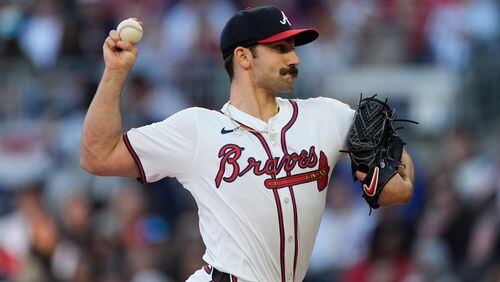First came the game, which saw Sean Newcomb come within one pitch from of history. Then came a Sean Newcomb apology, and not for having failed to work a no-hitter. Welcome to the wide world of sports, 2018 edition.
We’ll go in chronological order, if that’s OK …
He was one strike away, and for a millisecond you thought he’d gotten it. The 1-2 pitch to Chris Taylor – a four-seamer, the 12th of the 13 four-seamers Newcomb would deliver in this ninth inning – caught the middle of the plate. Taylor didn’t swing. A massive cheer gathered in the collective throat of the SunTrust Park audience, but there it died.
Plate umpire Shane Livensparger called it Ball 2, as opposed to the Strike 3 that would have ended the Atlanta Braves’ first no-hitter since 1994.
“I did flinch,” said Brian Snitker, the Braves’ manager.
“It was up,” said Kurt Suzuki, who gloved the pitch, though he also conceded: “I was waiting to hear ‘Strike 3.’ ”
Newcomb’s next pitch was a changeup, his only one of the ninth. Taylor fouled it off. Then came Pitch No. 134 of the day. Suzuki set his mitt high and inside. That’s where this four-seamer, timed at 94 mph, arrived. Tucker slapped a ground ball to the left side. Four feet farther left and the play would have ended with the Braves jumping around on the mound. But no.
Third baseman Johan Camargo dove but couldn’t lay a glove on it. Clean single. Newcomb had gotten 96.3 percent of the way to a no-no, only to be undone on his final pitch.
Suzuki: “I was crushed.”
Newcomb: “I felt happy that I got that far, annoyed that it was just a ground ball through the hole.”
Suzuki: “It felt like we lost. It felt like it was a walk-off hit.”
It wasn’t. The Braves would beat the Dodgers 4-1. (Yes, that ever-reliable Braves bullpen yielded a run after Newcomb’s departure.) They drew within 1½ games of first place in the National League East. It was a happy day in every regard except that Newcomb couldn’t quite get the 27th out.
And then, suddenly, it wasn’t. Tweets from @SeanNewk made between between August 2011 and April 2012 – Newcomb was then 18 – were reposted just after the game ended. They contained racist, sexist and anti-gay language.
A half-hour after reporters had conducted their postgame interviews and returned to the press box, an announcement was made: The clubhouse would re-open for Newcomb to speak again. About what, we asked? Do a Google search, we were told. We did, even as we were making our way back downstairs.
“I wanted to apologize for the insensitive material,” Newcomb said. “I didn’t mean anything by it. It was just something stupid (among friends). … It definitely won’t happen again. … It was a long time ago. I was young and foolish.”
He’d seen the resurfaced tweets himself on his phone after he’d conducted Round 1 of his postgame interviews. (Something similar had happened with Milwaukee’s Josh Hader during the All-Star Game.) And what’s our takeaway here? That racist, sexist and anti-gay language is ugly and repellent? Yes, definitely. But also: Has anything good ever come from Twitter?
Thus did one of the brightest days of a smiley-face Braves season end on a downer. Newcomb posted some stuff a while ago that he shouldn’t have posted. Do such words reflect Newcomb’s inner feelings today? Only one person knows that, and I’m fairly certain he won’t be touching a keypad anytime soon. (For the record, Newcomb said they don’t.)
Alex Anthopoulos had addressed the media after Newcomb had addressed the media the first time, the general manager’s purpose being to comment on the trade the Braves had just made for reliever Brad Brach. (Yes, a lot of stuff happened Sunday.) But Anthopoulos began his remarks by asking about the 1-2 pitch to Taylor, and then he said of the almost no-hitter: “We’ll be talking about this for years to come. That’s part of sports.”
Only minutes later, Newcomb was talking again, this time not about the best performance of his professional life. He’d worked a tremendous game against an excellent team. When Snitker came to remove Newcomb after Taylor’s single, the manager said he’d told his pitcher “how proud I was of him.” Before nightfall, the same pitcher would speak into media microphones about something unrelated to pitching, looking not proud but abashed.
So how, someone asked, would Newcomb recall the day of July 29, 2018 – as the time he nearly threw a no-hitter or the occasion of his apology?
“As the day I had a good start against the Dodgers,” he said.
Maybe he will. Maybe, I said.






